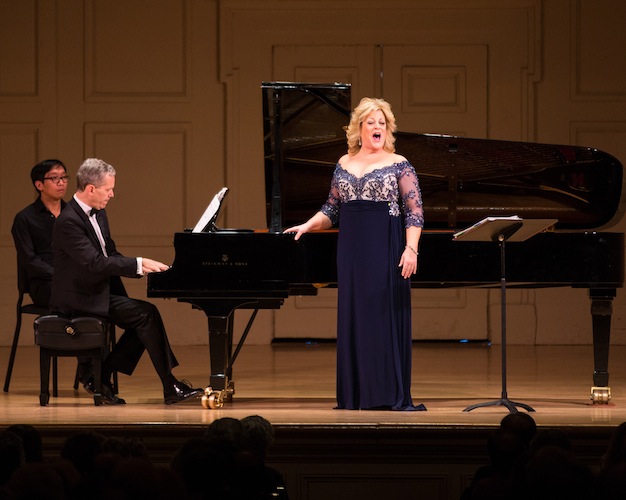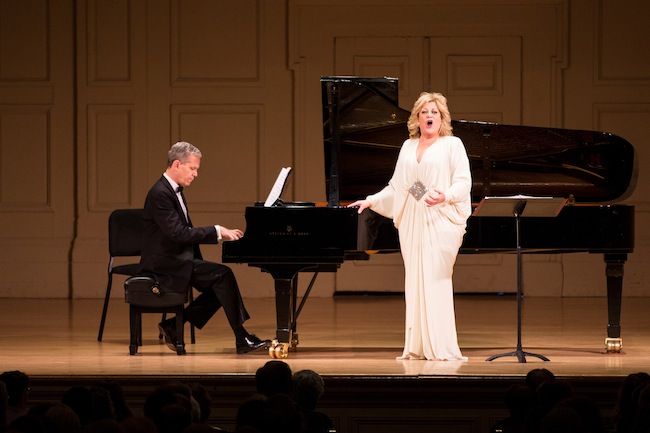Concert Review: Deborah Voigt — Not Your Ordinary Diva
In both appearances here, courtesy of the Celebrity Series, Deborah Voigt was sensational and very likable to boot. This cannot be said of all divas.
By Susan Miron
Thanks to the Celebrity Series, Bostonians were lucky this season, having a chance to see and hear the celebrated dramatic soprano Deborah Voigt twice. The first time was in her one-woman confess-all show, Voigt Lessons in November. Her Symphony Hall recital was on April 27; this was the third time she has appeared via the Celebrity Series. In both appearances she was sensational and very likable to boot. This cannot be said of all divas.
Voigt, or Debbie as she called herself in her show, walks out on stage, sparkling from head to toe — bracelet, earrings, dress, smile. No one is happier to be the center of attention than this self-described “stage beast.” Voigt loves giving song recitals, telling The Boston Globe: “The barrier between you and the audience is stripped away… You don’t have to follow the guy with the stick. I have a chance to be Debbie Voigt singing, and not Deborah Voigt the opera singer with horns and a helmet.”
It has now been a decade since the episode of “The Dress Size Heard Round the World,” when Voigt was fired from the Royal Opera at Covent Garden for not fitting into the little black dress designed for its production of Ariadne. At that point, Voigt was the one of the leading dramatic sopranos in the world, having starred in major productions of Strauss (Ariadne auf Naxos, Elekta, Die Frau ohne Schatten, Der Rosenkavalier) and Wagner (Tannhäuser, Die Fliegende Holländer, Tristian and Isolde). No one before the Covent Garden had made her large size (over 300 pounds) a contentious issue. Voigt’s ordeal became so notorious that it earned its own operatic insiders’ lingo, as in “The Ring,” “The Three Tenors,” “The Met” and “The Dress.”
“I can’t sing a concept,” she confessed when referring to the Covent Garden disaster in Voigt Lessons. Voigt has a mischievous, withering sense of humor. She usually chatters between songs, making a recital hall feel more like her living room. “Concepts are the refuge of directors who don’t trust the music… Here’s a concept: a gay Ring of the Niebelungen in which Siegfried wears a little black dress.”
This scandal was followed — although Voigt says it’s coincidental — with her decision to undergo gastic bypass surgery. Soon after that, an article in Opera News (October 2006) warned:
What escalates Deborah Voigt’s story from mere weight loss saga toward something more Faustian is the still-undermined effect of the surgery on her singing, generally acknowledged pre-surgery to be just about the finest, technically and tonally, in opera. Her Faustian bargain is multi-fold, the potential ironies poignant. Whether by choice or happenstance, ‘The Dress’ and ‘The Surgery’ have effectively positioned Voight as a potential crossover artist, with a significant pop-cultural profile as well as a more saleable silhouette.
Happily, Voigt has enjoyed success in both personae of late. In the summer of 2011 she starred in the Glimmerglass Opera’s Annie Get Your Gun, which was shortly after she wowed the world as Brünhilde in Wagner’s Ring at the Met. She has become an admired, telegenic host for the Met in its HD Saturday afternoon broadcasts, and she has added more popular repertoire to her recitals. Part of what makes judging her voice — in terms of post-surgery transformation — so difficult is that she is now ten years older.
Still, needless to say, there was discussion about The Voice and How It Has Changed in the halls during and after the performance. To this listener, it was an afternoon of high fun and high notes, and also a time to discover new, revelatory pieces by well-known composers. It began with three lovely songs by the American composer Amy Beach (a.k.a. Mrs. H. H. A. Beach): “The Year’s at the Spring,” “Ah, Love But a Day,” and “I Send my Heart Up to Thee.” Voight has been quite public in her disappointment that there were so few women composers, and it was good to hear more of Beach than the occasionally-played instrumental pieces.
Voigt won the Tchaikovsky Competition in 1990 with the two ravishing songs she sang on Sunday. This gave her the perfect opportunity to make jokes about how she has(n’t) aged. She launched into five songs by Richard Strauss, who is a favorite composer for many sopranos. Strauss’s wife, Pauline, a soprano, was undoubtedly the inspiration for his lavish outpouring of songs and opera roles for the soprano voice. The second offering, “Schlechtes Wetter” (Bad Weather), was greeting with chuckles by some audience members impatient with our lingering winter-like climate. These songs were gorgeously sung, but the last, a perennial favorite of singers (and audiences) everywhere, “Zueignung,” was spectacular. Voigt’s many high notes, especially when they were sustained, seem to make the hall itself quiver.
Okay: what she wore. First half — darkish blue dress with lots of sparkles on the sleeves. Second half — a white, v-neck goddess dress, gathered in the center with a big sparkling diamond-shaped ornament. Are there any divas these days who don’t change their costumes at half-time? I think not.
The second, all-American half began with four tuneful, soulful pieces by Benjamin Moore (born 1980), sung and acted to perfection. In “To the Virgins, To Make Much of Time,” Voight stared at her watch and confided, “This would be my mother’s favorite song.” In “This Heart That Flutters” and “I am in Need of Music” she was mesmerizing. Regarding the 13 songs of the second half of the recital, having the texts in the program would have increased our listening pleasure. Not only would it have refreshed our recollection of the songs, but it would given the poets/lyricists credit. The Celebrity Series should rethink its practice of not having program notes for vocal recitals. Big oversight! And while I am quibbling, Voigt’s speaking voice, if aimed in the wrong direction, was inaudible. It was frustrating to miss out on her often-hilarious quips.
Voigt never met Leonard Bernstein (1918-1990), but she clearly finds an affinity with the six songs he composed, some of which I had never heard before. They were quite engaging, suiting Voigt’s voice and personality to a tee. At this point, one should add that soprano’s pianist, the extraordinary Brian Zeger, was brilliant all afternoon, co-creating the mood of each and every song, many of which ended with major piano parts. (The pair have a CD entitled All my Heart on EMI Classics.) The tune “So Pretty” revolved around a child who doesn’t understand why the “pretty people” have to die in order to have peace. Voigt did several of the songs, such as “(I’ve had) Another love,” while leaning on the piano. This was a relaxed singer (and pianist) obviously enjoying themselves. “It’s Gotta be Bad to be Good” from On the Town was delivered with enormous panache. The set ended with “Somewhere,” at first with Voigt alone, then with a sketal piano. Voight has been candid about her bad luck in love, and she certainly knows how dramatize longing and desperation.
A set of three clever songs by William Bolcom (b. 1938) kicked off with “Toothbrush Time,” which centers on boy friend who raids his girl’s bathroom and comes out smelling like her. This gave Voigt a good chance to exercise her comedic chops. “At the Last Lousy Moments of Love” deals with a lover who “wants to tell me the truth… as a friend,” but tells “it all to the body of my best friend.” “I have no idea what this song is about,” Voigt teased. In Voigt Lessons she was more direct, asking why “is it always a friend?”
There were two wonderful encores; Voigt definitely saved the best for last. “I Love a Piano” from Irving Berlin’s Easter Parade gave us Voight crooning seductively. Caressing the piano, she quipped, “I know a fine way to treat a Steinway.” Then, sitting down on the piano bench with Zeger, she played some amusing music for 4-hand (the crowd loved this!). “Can’t Help Lovin’ Dat Man” by Jerome Kern (from Showboat) ended the performance. One might raise a question or two about Voigt’s voice, but her emotional power and range made each song a memorable personal and musical statement.
Susan Miron, a harpist, has been a book reviewer for over 20 years for a large variety of literary publications and newspapers. Her fields of expertise were East and Central European, Irish, and Israeli literature. Susan covers classical music for The Arts Fuse and The Boston Musical Intelligencer. She is part of the Celtic harp and storytelling duo A Bard’s Feast with renowned storyteller Norah Dooley and plays the Celtic harp at the Cancer Center at Newton Wellesley Hospital.


